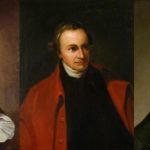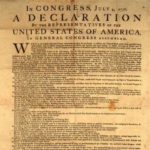In the real world, the ability of free blacks to enjoy their natural rights and exercise the privileges and immunities of citizenship depended on the states where they actually lived. When those states imposed a raft of legal discriminations on free blacks they cheapened the meaning of freedom and discounted the value of citizenship. I suspect this bothered Lincoln, but it wasn’t his issue. It would take other men and women, and another century of struggle, before “states rights” was abolished. Free registration for students and teachers required to access resource.
Foundations of Democracy
What are the three foundations of American democracy and how do they work together? Explore the National Constitution Center’s Foundations of Democracy learning module to uncover the connections between popular sovereignty, natural rights, and rule of law.
Civic Conversations
How do educators invest in productive, deep, and transformative dialogue in their classrooms? Civic Conversations is a collaboration between the Edward M. Kennedy Institute’s civic education programming and the community-building dialogic structure practiced by Essential Partners. Explore resources, activities, and lesson structures that support educators as they facilitate difficult conversations, create inclusive learning environments, raise complex discussions, and promote a safe space for students to consider their values and engage in their communities. Policy simulations at the Kennedy Institute reflect the wide range of issues that face our country today. Students debate the best way to reform our immigration system, consider the balance between privacy and security, and think about how to meet the challenge of climate change. As in the real Senate, it’s natural that students will disagree on the best approach to many civic issues. This collection of resources will support educators as they prepare to discuss civic issues, either in preparation for a Kennedy Institute field trip or to practice listening, sharing, and learning in the classroom.
Antifederalist Objections to the Constitution

This short video highlights two major Antifederalist objections to the Constitution. They were concerned that the Constitution did not contain a bill of rights, something many colonial charters and state constitutions had included. Secondly, the Constitution significantly reduced state sovereignty in favor of a stronger central government. Professor John Kaminski examines the Antifederalist concerns about the ambiguous nature of the power of the central government.
The Reconstruction Amendments: Official Documents as Social History
The Fourteenth Amendment was the most important constitutional change in the nation’s history since the Bill of Rights. Its heart was the first section, which declared all persons born or naturalized in the United States (except Indians) to be both national and state citizens, and which prohibited the states from abridging their “privileges and immunities,” depriving any person of life, liberty, or property without due process of law, or denying them “equal protection of the laws.” Free registration for students and teachers required to access resource.
Case of Gerry Gault
In this lesson, students will learn about the events that led to the case In re Gault, and will recognize this case’s importance to juvenile rights and juvenile court proceedings. Students will list those parts of the case that they believe were carried out fairly, and those that they believe were unfair to Gault. Students’ concerns about the case are compared to the actual reasons given by the Supreme Court. The lesson leads naturally into a discussion of due process.
Why Government? (Lesson Plan)
Students take a look at two political thinkers that spent a lot of time trying to answer the question, “Why Government?” – Thomas Hobbes and John Locke. This lesson combines our Influence Library entries on these men and adds activities that ask students to compare and contrast Hobbes and Locke and to think about how these philosophers influenced those that followed in their footsteps. This lesson is one in a series entitled “Foundations of Government.”
“An Expression of the American Mind”: Understanding the Declaration of Independence

The major ideas in the Declaration of Independence, their origins, the Americans’ key grievances against the King and Parliament, their assertion of sovereignty, and the Declaration’s process of revision. This lesson will focus on the views of Americans as expressed in primary documents from their own time and in their own words.
Slavery and the American Founding: The “Inconsistency Not to Be Excused”
The Argument of the Declaration of Independence
In this lesson, students attempt to formulate their own declarations before examining the Declaration of Independence. Through a close reading of the document, they come to an understanding of how its structure forms a coherent, lucid, and powerful argument for independence.
